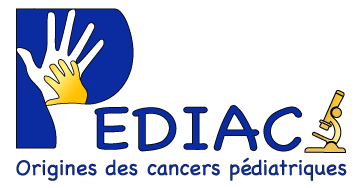RESEArch team Olivier Ayrault
Biology underlying childhood brain tumors
Olivier Ayrault ‘s team was initially created as an ATIP-AVENIR Team in 2011 at the Institut Curie (Orsay) and is part of the Unit “Signaling, Radiobiology and Cancer” since 2020. His team aims at deciphering fundamental mechanisms related to the complex biology of the pediatric brain tumor arising from the developing cerebellum: Medulloblastoma,
which is one of the most common malignant brain tumor of childhood. The originality of their work lies on the characterization of the putative relationship exiting between mechanisms governing cerebellar development and medulloblastoma
formation in order to generate relevant cancer models. His teamwork wishes to illustrate how tumor delineation with respect to the tissue-specific developmental program impacts clinical and biological breakthroughs in pediatric brain
tumors. Hence, they have been implemented an innovative interdisciplinary approach at the interface of developmental neurobiology and cancer.
Their main objectives are the following:
• Investigating key players and associated mechanisms in both cerebellar development and cancer using advanced technology.
• Undertaking a comprehensive overview of the medulloblastoma biology utilizing groundbreaking multi-omics analysis.
They initially deciphered molecular mechanisms underlying the regulation of the bHLH transcription factor Atoh1, a master regulator of cerebellar development and medulloblastoma, in order to find novel therapeutic
targets. They identified and validated several modulators of Atoh1’s regulation and function, including the E3 Ubiquin Ligase Huwe1 (Forget*, Bihannic* et al., Dev Cell, 2014). Also, to get a realistic picture of Atoh1 behaviour
in the cell, they developed cutting edge technologies in state-of-the-art neuronal labeling and imaging allowing them to study Atoh1 associated functions in the physiological environment of the protein (Chang et al, Dev Cell, 2019).
Altogether, the team unravels novel functions for Atoh1 using advanced and newly developed technology. Their findings gave invaluable information on critical molecular mechanisms implicated into medulloblastoma that are currently
transferring to the biomedical industry.
In parallel, to go one step further and hoping to find out and dissect many more actors involved in the development of medulloblastoma, they recently thought to tackle broader and inherent questions related to the complex biology
of this developmental disease. One fundamental and unsolved question in the field has been the characterization of unique molecular characteristics for the different medulloblastoma subgroups in order to develop specific patient
outcome in regard to their subgroup affiliation. In that context, a milestone achievement of Dr. Ayrault’s group has been the development of a multi-omics profiling of all subgroups of medulloblastoma. This project
led Dr. Ayrault to coordinate and associate a large number of different reservoirs of expertise including basic science, clinical research, bioinformatics among national institutions and leading international teams. This work published
in 2018 is a comprehensive multi-omics characterization of 40 medulloblastoma samples including proteome and phosphoproteome analyses (Forget et al., Cancer Cell, 2018). Their study clearly demonstrates that proteomic could (i) define
medulloblastoma subgroups and (ii) allows the discovery of unappreciated signalings not visible at the genomic or transcriptomic levels (Hovestadt et al., Nature Reviews Cancer, 2020). Interestingly, their work highlighted an activation
of the RTK signaling in the most abundant subgroup of medulloblastoma. Overall, studies from the group have emphasized the relevance of proteomic analyses as it could bring invaluable cues to the understanding of complex biological
processes underlying pediatric tumors.
In the PEDIAC consortium, along with several teams, the group will focus on the characterization of ontogenic determinants of pediatric oncogene specificities. More specifically, they will use experimental models
to characterize the cellular and molecular impact of changes observed during different stages of ontogeny on medulloblastoma formation. The team will also bring its expertise on omics for further characterization of the different
pediatric entities (WP2). Taking advantage of their proteomic expertise, the team aims in parallel at characterizing a large spectrum of pediatric entities through a comprehensive analysis. They wish to unveil cellular and molecular
heterogeneity of tumor cells using an integrative proteomics-based approach (WP3).
